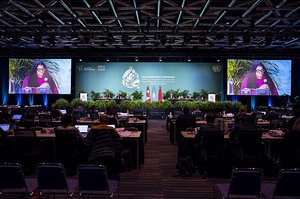As world leaders gather together in Montreal to discuss how to protect the world’s rapidly dwindling biodiversity, Global Witness is pushing governments in key consumer countries to pass laws that protect vital tropical forests, which contain an estimated 80% of the world’s terrestrial biodiversity.
As COP15 continues in Montreal, Friends of the Earth, Global Witness and 71 other NGOs have released an open letter calling on governments to:
- Enact stronger regulation on corporations linked time and time again to deforestation
- End impunity for financial actors who bankroll ecosystem destruction
- Protect the human rights of Indigenous Peoples under national and international law

Forest in Papua New Guinea was destroyed due to illegal logging and forest destruction by companies. Credit: Global Witness
The objective of the COP is to agree a Global Biodiversity Framework that will halt and reverse biodiversity loss by 2030, which cannot be achieved without an urgent end to deforestation financing. Like the other signatories to the letter, we do not believe that voluntary initiatives – such as the Taskforce on Nature-related Financial Disclosures (TFND), which is being designed now– will adequately protect the world’s forests and the plant and animal species that live within them. Not least because the TFND Secretariat, as Global Witness and others have highlighted time and time again, has failed to incorporate essential feedback on numerous counts.
The TNFD currently does not require businesses to report on their own negative impacts on nature (known as “double materiality” reporting), avoids holding companies to task on how they threaten human rights defenders, and does not require companies to declare past or existing complaints made against them. All in all, more companies marking their own homework will mean more greenwashing.
Some banks are as tired of these initiatives are we are. In the run up to the ambitious new deforestation law agreed in Brussels this week, Triodos Bank and other signatories with over €177 billion under management called for the EU to regulate the financial sector. These interventions are vitally important in showing how some banks don’t consider regulation “bad for business”, and will be key to advancing the argument for stronger laws in consumer countries across the globe.

The spotlight is on leaders and representatives at COP15 in Montreal. Credit: UN Biodiversity Creative Commons
The signs are that our message on the need for legislation is getting through. Recent developments in the EU and UK show growing support for regulation of finance. The EU’s new law commits the European Commission to publishing a proposal that would require the financial sector to conduct due diligence checks to stop investments that cause deforestation within two years after the law enters into force. And in the UK, MPs from many parties recently supported an amendment to the Financial Services and Markets Billwhich would oblige financial institutions to conduct due diligence to prevent them from financing deforestation.
It’s a good start, but we’re still nowhere near where we need to be. We need governments to return home after Montreal and put plans before their parliaments that stop the endless flow of money from big banks to the companies that destroy the world’s forests – once and for all.

